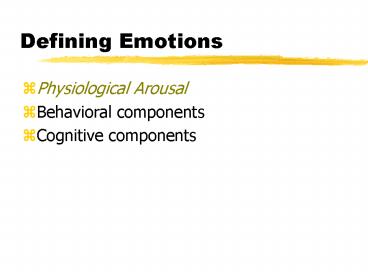Defining Emotions - PowerPoint PPT Presentation
1 / 30
Title:
Defining Emotions
Description:
Use of Polygraphs. lying should increase physiological arousal ... Judged innocent by polygraph. Judged guilty by polygraph. Emotion- Lie Detectors ... – PowerPoint PPT presentation
Number of Views:35
Avg rating:3.0/5.0
Title: Defining Emotions
1
Defining Emotions
- Physiological Arousal
- Behavioral components
- Cognitive components
2
The Chicken or the Egg?
- Do we think, then feel or do we feel, then think
? - Brain processes
- Basic vs. Complex emotions
3
Early Theories of Emotion
- James-Lange Theory
- argues that physiological arousal precedes and
causes emotion - Cannon-Bard Theory
- Emotion and physiological arousal occur
simultaneously
4
Schachters Two-Factor Theory
- Physiological Arousal Cognitive label
- Our appraisal of the emotion arousing situation
contributes to the label we attach to the emotion
5
Role of the Brain
- Limbic System
- Amygdala
- allows emotional response to begin before full
awareness occurs. - Right Hemisphere
- involved in emotional expression and recognition
- Opponent-Process Theory
6
Cognition and Emotion
- The brains shortcut for emotions
7
Two Routes to Emotion
8
Opponent-Process Theory of Emotion
9
Sympathetic Nervous System
- Different emotions associated with different
types of arousal (especially for negative
emotions) - Use of Polygraphs
- lying should increase physiological arousal
- Problems too easy to obtain false positives and
false negatives. - Guilty knowledge test
10
Emotional Arousal
11
Emotion- Lie Detectors
- Control Question
- Up to age 18, did you ever physically harm
anyone? - Relevant Question
- Did the deceased threaten to harm you in any way?
- Relevant gt Control --gt Lie
12
Emotion-Lie Detectors
13
Emotion-Lie Detectors
- 50 Innocents
- 50 Theives
- 1/3 of innocent declared guilty
- 1/4 of guilty declared innocent (from Kleinmuntz
Szucko, 1984)
14
Emotion-Lie Detectors
- Is 70 accuracy good?
- Assume 5 of 1000 employees actually guilty
- test all employees
- 285 will be wrongly accused
- What about 95 accuracy?
- Assume 1 in 1000 employees actually guilty
- test all employees (including 999 innocents)
- 50 wrongly declared guilty
- 1 of 51 testing positive are guilty (2)
15
Arousal and Performance
- Performance peaks at lower levels of arousal for
difficult tasks, and at higher levels for easy or
well-learned tasks
Performance level
Difficult tasks
Easy tasks
Low
Arousal
High
16
Defining Emotions
- Physiological Arousal
- Behavioral components
- Cognitive components
17
Non-Verbal Communication
- Tone of voice
- Posture
- Gestures
- strong cultural influence
- Distance
- Touch
18
Gender Differences
- Women better at decoding expressions
- Women seem to have more frequent and intense
emotions. - Women express empathy more often.
- Why do these differences exist?
- Socialization
- Role expectations
19
Expressing Emotion
- Gender and expressiveness
20
Facial Expressions
- Darwin
- emotions prepare us for action, signal others,
and influence behavior. - emotions are adaptive (enhance survival)
- Ekman
- cross-cultural studies universal emotional
expression for the basic emotions - facial feedback hypothesis
21
Basic Emotions
- Happiness
- Sadness
- Anger
- Fear
- Surprise
- Disgust
22
Expressing Emotion
- Culturally universal expressions
23
Defining Emotions
- Physiological Arousal
- Behavioral components
- Cognitive components
24
Fear
- Learning Fear
- The biology of Fear
- Role of the amygdala
25
Anger
- Catharsis
- emotional release
- catharsis hypothesis
- releasing aggressive energy (through action or
fantasy) relieves aggressive urges - Best ways of dealing with anger
- Wait
- Discuss or exercise
26
Happiness
- Feel-good, do-good phenomenon
- peoples tendency to be helpful when already in a
good mood - What makes us happy?
27
Experiencing Emotion
- Does money buy happiness?
28
Experiencing Emotion
- Values and life satisfaction
29
Experiencing Emotion
- Adaptation-Level Phenomenon
- tendency to form judgements relative to a
neutral level - brightness of lights
- volume of sound
- level of income
- defined by our prior experience
- Relative Deprivation
- perception that one is worse off relative to
those with whom one compares oneself
30
Happiness is...































